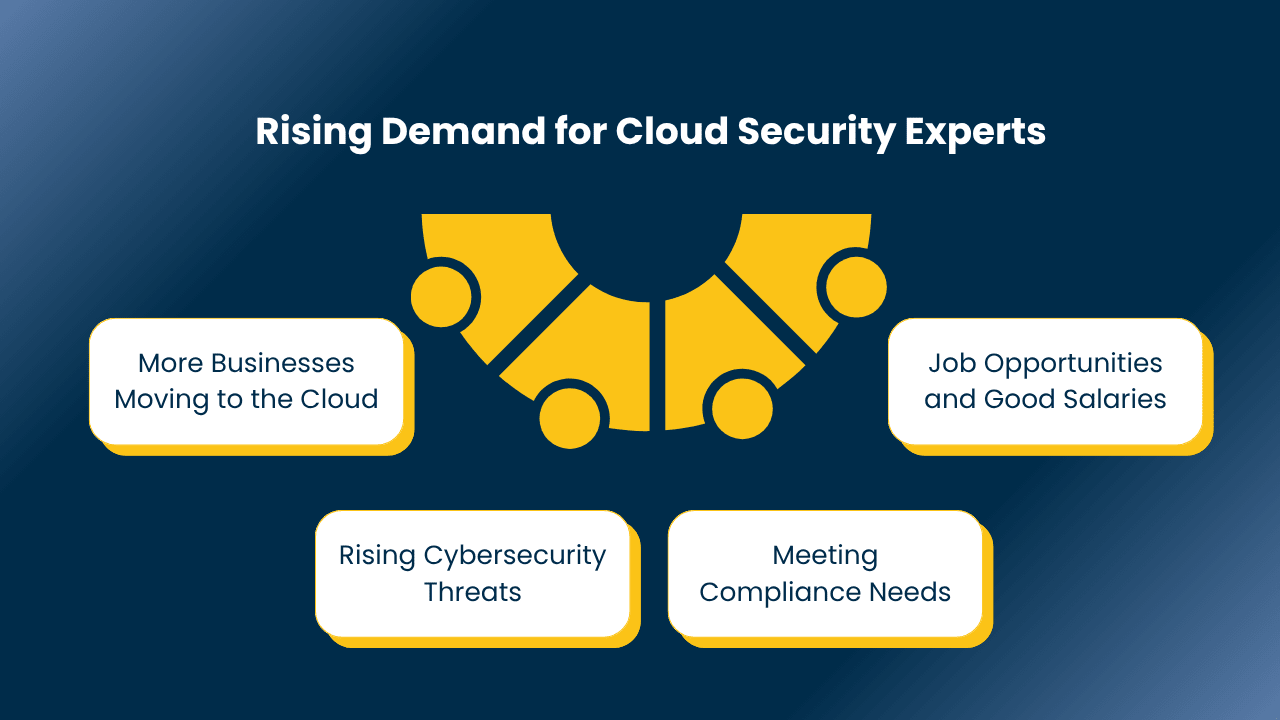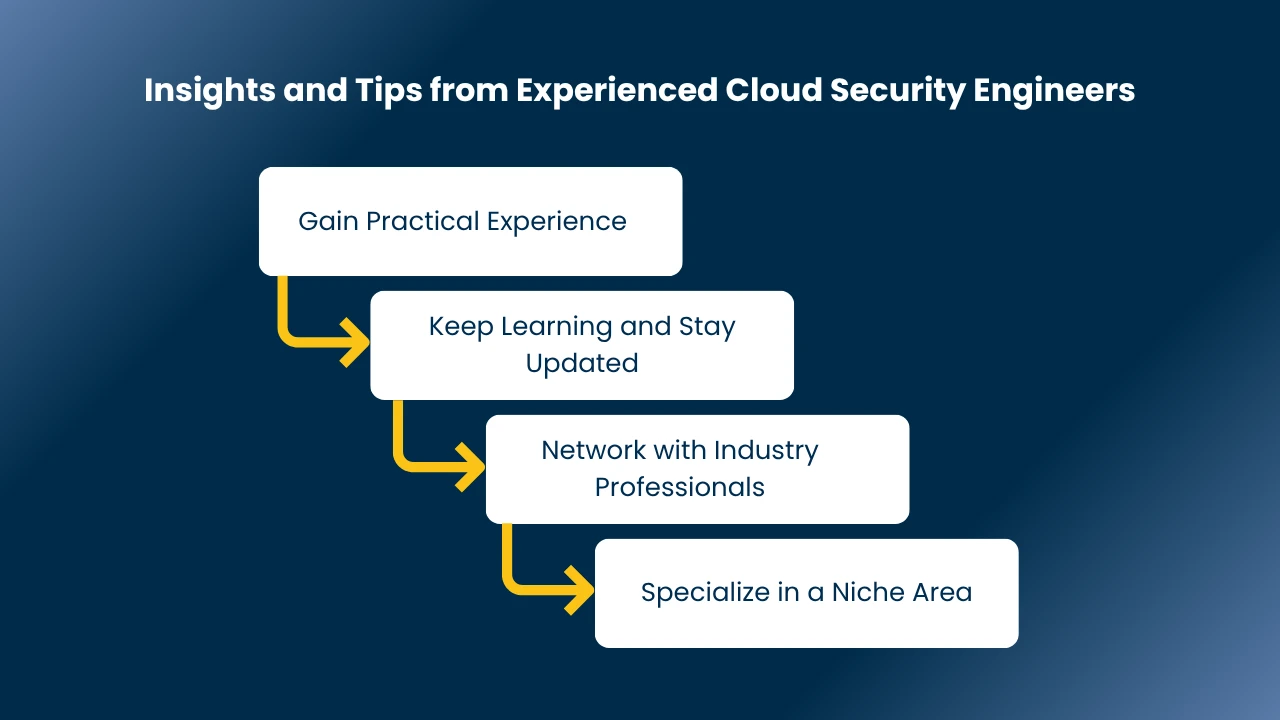A Guide on Cloud Security Engineer Career Path and Growth

Cloud security is one of the fastest-growing areas in cybersecurity. As more companies move their data and operations to the cloud, the need for skilled professionals to protect these environments keeps rising. Becoming a Cloud Security Engineer opens the door to a stable, high-demand career with global opportunities. Many companies now look for a professional cloud security engineer to secure their systems and keep data safe. In this blog, we will talk about the career path, skills, demand, and growth in cloud security.
Is Cloud Security a Good Career Choice?
Here’s why cloud security is a strong and future-proof career path:
High Demand and Job Stability
Cybersecurity threats are rising, and businesses are moving more of their data to the cloud. This shift is creating a strong demand for professionals with cloud security skills. Cloud Security Engineer jobs are expected to grow quickly as companies prioritize data safety and regulatory compliance.
Strong Salaries and Career Growth
Cloud Security Engineer salary packages are highly competitive. In the U.S., experienced professionals often earn $100,000 or more per year. Even in entry-level positions, the pay is better than many other tech roles. Cloud security engineer certification such as AWS Security, Microsoft Certified: Azure Security Engineer Associate or Google Professional Cloud Security Engineer can lead to higher-paying jobs and faster promotions.
Wide Range of Career Options
Cloud security is used in every industry, from finance and healthcare to tech and government. Cloud security engineer roles and responsibilities vary across sectors, so there’s room to grow and specialize. Common roles include Cloud Security Engineer, Cloud Security Analyst, Cloud Security Architect, and DevSecOps Engineer.
Work Flexibility and Remote Opportunities
Many cloud security engineer jobs offer remote or hybrid options. This flexibility makes it easier to balance work and life, while still building a rewarding tech career.
How to Pursue a Career as a Cloud Security Engineer
To become a Cloud Security Engineer, you need to follow a structured approach that includes education, skill development, gaining experience, and earning certifications. Let’s take a look at the steps involved in pursuing this career.
Step 1: Education
The foundation of a career as a Cloud Security Engineer starts with formal education. Most employers require a bachelor’s degree. Common fields of study include:
- Computer Science
- Information Technology
- Computer Information Systems
- Electrical Engineering
- Business Administration
While a bachelor’s degree is typically enough, some employers may prefer candidates with a master’s degree in cybersecurity, computer science, or a related field. A strong educational background provides you with the necessary technical knowledge to understand cloud computing and security concepts.
Step 2: Develop Important Skills
Once you have your degree, it’s essential to develop the technical and workplace skills needed for the role. Cloud Security Engineer requirements include both specialized knowledge and general workplace skills.
Technical skills include:
- Proficiency in object-oriented programming languages (Java, Python, Ruby, C++)
- Knowledge of cloud platforms like Amazon Web Services (AWS) or Microsoft Azure
- Understanding of cloud security, including data protection, encryption, and threat detection
- Familiarity with scripting languages (JavaScript)
- Incident response skills
- Experience with agile methodologies and tools
Workplace skills that are crucial for a Cloud Security Engineer include:
- Effective communication
- Problem-solving ability
- Strong research and analytical thinking
- Leadership and management skills
- Self-motivation and initiative
Step 3: Gain Relevant Experience
To become a Cloud Security Engineer, experience in security or cloud computing is necessary. You can start in entry-level positions like an Information Security Analyst or Security Officer. Cloud security engineer roles and responsibilities often involve monitoring and securing cloud infrastructures, which requires hands-on experience. It typically takes around five to seven years of work in cloud computing or cybersecurity to step into a Cloud Security Engineer position.
Step 4: Earn Certifications
While certifications are not always mandatory, they can help you build expertise and stand out to employers. Here are some common certifications for Cloud Security Engineers:
- Cloud Security Engineer Certification (e.g., AWS Certified Security – Specialty, Google Cloud Professional Cloud Security Engineer): These certifications validate your ability to secure cloud environments and understand cloud-specific security challenges.
- Certified Information Systems Security Professional (CISSP): A globally recognized certification that proves your IT security skills.
- Certified Cloud Security Professional (CCSP): This certification from ISC2 demonstrates knowledge of cloud security principles and best practices.
- Certificate of Cloud Security Knowledge (CCSK): Offered by the Cloud Security Alliance, this certifies your understanding of cloud security programs and protocols.
These certifications enhance your skills and increase your chances of landing a role as a Cloud Security Engineer.
Also Read: How to Become a Successful SailPoint IdentityNow Consultant
Rising Demand for Cloud Security Experts
As more businesses move their operations to the cloud, the need for skilled cloud security professionals is growing rapidly. This shift is happening because companies want to keep their data safe and comply with changing regulations. Here’s why cloud security roles are in such high demand:
More Businesses Moving to the Cloud
Companies are increasingly relying on cloud services to manage their data and applications. This creates a huge demand for Cloud Security Engineers to ensure these systems are secure and protect sensitive information.
Rising Cybersecurity Threats
As cyberattacks become more common and complex, businesses need experts who can protect their cloud environments. Cloud Security Engineers are critical for spotting vulnerabilities, managing risks, and keeping threats at bay.
Meeting Compliance Needs
With strict regulations around data privacy and security, many businesses need professionals who can help them stay compliant. Cloud Security Engineers ensure that organizations meet these legal requirements while securing their cloud networks.
Job Opportunities and Good Salaries
As the demand for cloud security experts grows, more jobs are available. Cloud Security Engineer roles come with competitive salaries, and in countries like India, the cloud security engineer salary is rising as professionals gain experience.
Career Opportunities for Cloud Security Engineers
The demand for Cloud Security Engineers has created a wide range of career opportunities. These professionals can work in different roles across various industries, providing plenty of room for growth. Here’s a look at some of the career paths available:
a. Diverse Roles: Cloud security professionals can take on roles such as Cloud Security Engineer, Cloud Security Architect, Compliance Analyst, and Security Consultant. This variety allows you to choose a position that suits your skills and career goals.
b. Career Advancement: The cloud security field offers numerous opportunities for growth. With experience, Cloud Security Engineers can move into senior positions, take on managerial roles, or specialize in areas like threat hunting or incident response.
c. Expanding Demand: As more companies adopt cloud technologies, the demand for cloud security engineers continues to rise. With the right cloud security engineer certification and hands-on experience, professionals can expect to find job opportunities in tech companies, finance, healthcare, and government agencies.
d. Lucrative Salaries: Cloud security roles come with attractive salaries. The cloud security engineer salary often increases with experience, and skilled professionals can earn competitive wages in both local and international markets.
Essential Certifications and Skills for Cloud Security
To succeed as a Cloud Security Engineer, acquiring the right certifications and developing specific skills is crucial. Here’s a look at the key certifications and skills that can help you excel in cloud security roles:
Certifications:
Certified Cloud Security Professional (CCSP): This advanced certification is ideal for experienced security professionals. It demonstrates your ability to manage and secure cloud environments.
AWS Certified Security – Specialty: This certification focuses on security practices within the Amazon Web Services (AWS) cloud, an essential certification for those working with AWS.
Microsoft Certified: Azure Security Engineer Associate: For professionals looking to specialize in securing Azure cloud environments, this certification is highly valuable.
Google Professional Cloud Security Engineer: This certification focuses on security in Google Cloud, making it valuable for those working with this platform.
CompTIA Security+: An entry-level cybersecurity certification that covers foundational security concepts. It’s a good starting point for those new to cloud security.
Key Skills:
Risk Assessment: The ability to evaluate potential risks in cloud environments and implement strategies to mitigate them.
Identity and Access Management (IAM): Understanding how to manage user permissions and access in cloud environments is crucial for a Cloud Security Engineer.
Encryption: Knowledge of encryption protocols and practices to protect data in the cloud.
Incident Response: The skill to quickly respond to and manage security incidents is vital for protecting cloud environments from breaches.
Cloud Platform Expertise: Familiarity with major cloud platforms like AWS, Azure, and Google Cloud is highly sought after in cloud security engineer jobs.
Read More: How to Become an IAM Engineer in India in 2025?
Insights and Tips from Experienced Cloud Security Engineers
As a Cloud Security Engineer, gaining knowledge and practical experience is key to success. Here are some valuable insights and tips shared by experienced professionals in the field:
1. Gain Practical Experience
While certifications are important, hands-on experience is crucial. Try setting up cloud security labs on platforms like AWS, Azure, or Google Cloud to gain practical skills that will strengthen your understanding of cloud security concepts.
2. Keep Learning and Stay Updated
Cloud security is constantly evolving. To stay ahead, continually learn by attending webinars, taking courses, and reading industry publications. Follow trends and updates related to new technologies and threats in cloud security.
3. Network with Industry Professionals
Networking is an excellent way to learn from others. Join LinkedIn groups, participate in cybersecurity forums, and attend industry conferences. Building relationships with fellow cloud security engineers can provide valuable insights and even job opportunities in cloud security engineer jobs.
4. Specialize in a Niche Area
Cloud security covers a wide range of topics, such as Identity and Access Management (IAM), compliance, incident response, and DevSecOps. Consider specializing in a particular area that interests you to enhance your expertise and become a sought-after professional in cloud security engineer roles and responsibilities.
Conclusion
Cloud security is a great career path for anyone who enjoys tech, solving problems, and keeping data safe. Working as a Cloud Security Engineer comes with strong job security, good pay, and plenty of room to grow. To succeed, focus on building real-world experience, getting certified, and learning constantly. A training course like the one from Orbus can help you get started with the right skills. With time and effort, you can build a career that’s both meaningful and future-proof.
Understand how Orbus can help your career!
Speak with an Expert Now!
FAQ's
How is cloud security as a career choice?
Cloud security is a growing field with lots of job opportunities. As more companies move to the cloud, the need for professionals to protect their data increases. It’s a promising career with good pay and job security.
How much experience is required to get into cloud security?
To get into cloud security, most employers want about 5 to 7 years of experience in IT or cybersecurity. This helps you understand how cloud systems work and how to keep them secure.
Can I become a Cloud Security Engineer without prior cybersecurity experience?
Yes, you can. It’s possible to enter cloud security without a cybersecurity background. With the right certifications, training, and hands-on experience, you can build the skills needed for the role.
How long does it take to become a Cloud Security Engineer?
Becoming a cloud security engineer usually takes 3 to 5 years. This includes gaining foundational IT knowledge, getting certifications, and getting hands-on experience in cloud security.
Is coding necessary for a Cloud Security Engineer?
Coding isn’t always required, but it helps. Knowing basic programming or scripting languages like Python or PowerShell can make tasks easier and help automate security processes. It’s a useful skill to have in cloud security.






